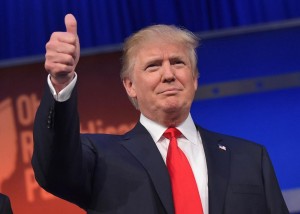Donald Trump: His Appeal, The Good, The Bad, and Pro Wrestling?
Monday, February 29, 2016 by Jonathan R. Gibbons in
Demystifying the Attraction of Donald Trump
Donald Trump is extremely likable to a sizable portion of the American electorate. There are even notable closet Trump supporters as Novelist Bret Ellis tweeted, “Just back from a dinner in west Hollywood: shocked the majority of the table was voting for Trump but they would never admit it publicly” (USA Today). Trump is comedic, he appears genuine, and he is unfiltered. He has charisma and charm. He is fearless and has depth of fortitude. Trump towers– pun intended –over political correctness, uptight feminists, and liberal college students who cry and moan about micro-aggression’s and virtually every other little thing that hurts their feelings. Trump is not bought and paid for. Trump is the money and so he says what he wants without fear; often with comical exaggeration. He is literally self-funding the majority of his campaign just like he says; 70% of his fundraising is from self-financing to be exact (Open Secrets). He is an established and brilliant business man who made billions for his companies throughout his lifetime. People who dislike Trump say things like, “he’s an idiot,” “he’s a bully,” “he’s just a reality show star,” “he’s unhinged,” “he’s a Clinton plant,” or “he’s a clown pretending to be a serious candidate.” Love him, like him, or hate him, Trump should be admired for many things.
A slew of Americans have grown tired of “cookie-cutter” politicians, special interest dominated candidates, and the overly scripted and predictable routines of the mainstream political movers and shakers. Like the WWE pro wrestlers and story-lines of today (e.g. Roman Reigns and the Authority), the typical political candidate is overly scripted, prepared, and, well, transparently fake as hell. This is why intelligent WWE fans reject their synthetically-pushed entertainers and plots, and it is also one of the reasons voters reject Jeb Bush and Marco Rubio. Meanwhile, WWE “creative” and the political “experts” scratch their heads in bewilderment at why their generic mannequin is not winning over the audience. Chris Christie exposed Rubio for this in the 8th Republican debate when he called him out for constantly regurgitating a rehearsed 25 second speech (see the video below). One of the reasons Rand Paul failed to garner his father’s supporters was because, unlike his father, he also came off overly scripted and fake.
Like the successful pro-wrestlers of old, e.g. Steve Austin, Hulk Hogan, and The Rock, the successful political candidates rise organically. They keep it real and connect with their audience because they relate to them and give them hope. They seduce them with their natural charm and charisma and never insult their subjects intelligence; they know how to flatter. By providing the electorate with a hope or view of restoring something they feel they are lacking, these seductive candidates spark the dormant passions of the apathetic voter. Ronald Reagan and JFK are timeless examples of political seducers. In his book, “The Art of Seduction“, Robert Greene says of JFK (my emphasis):
Kennedy’s seduction of the American public was conscious and calculated. It was also more Hollywood than Washington… All of Kennedy’s actions were framed in the conventions of Hollywood. He did not argue with his opponents, he confronted them dramatically… He did not discuss policy details but waxed eloquent about grand mythic themes, the kind that could unite a divided nation (Make America Great Again!, Change!). (Greene 2001, 124-125)
Mass seducers such as Napoleon or John F. Kennedy offer their public just what it lacks. When Napoleon came to power, the French people’s sense of pride was beaten down by the bloody aftermath of the French Revolution. He offered them glory and conquest. Kennedy recognized that Americans were bored with the stultifying comfort of the Eisenhower years; he gave them adventure and risk. (The Moon Landing, Build a Great Wall!) (Greene 2001, 174)
Almost any student of politics will acknowledge that most voters do not vote based on a candidate’s policies or credentials, but based on the character and likability of the candidate. Reagan was likable, Kennedy was likable, and Trump is likable. Most voters are driven by their passions and instincts. They pick or choose three major issues and if a candidate shares the same opinion, they are likely on board. If that candidate also possesses the aforementioned seductive prowess, then the voter is on board with a passionate flare. But what really matters most when choosing a candidate is not their likability or catchy slogans, but their legitimate policy proposals, their professional credentials, and their overall behavior and how it reflects upon their true character.
Evaluating Trump vs. Clinton Beyond Likability
In their book on body language and recognizing an individuals evolutionary-programmed behaviors, ex-FBI agent Joe Navarro and psychologist Marvin Karlins explain that, “…the best predictor of future behavior is past behavior” (Navarro & Karlins 2008, 12). This is precisely why Hillary Clinton is a terrible choice for president. She was for the Iraq War, then against it; against gay marriage, then for it. Her past behavior shows that she cannot be trusted. Clinton is a proven liar and her current policy proposals are, hence, unreliable. Additionally, unlike Trump or Bernie Sanders, the overwhelming majority of her funding, 77%, comes from big donor special interests (Open Secrets). There is no doubt Clinton has the experience to be president, but she has no credibility when it relates to her policies or her character. She seduces by flattering the populace with potentially being the first female president; she is fake and it is transparent to the cognizant voter. Bernie Sanders, conversely, has a consistent voting record and his policy proposals should be taken as honest offers. Sanders also receives 70% of his donations from small donors (Open Secrets).
(more…)
The 1st 2016 Republican Primary Presidential Debate – Jeb Who?
Friday, August 07, 2015 by Jonathan R. Gibbons inOverall, the moderators and the establishment candidates clearly focused on Donald Trump and Jeb Bush. This appeared to be a giant indiscreet rub for Bush, or Jeb, as they’d like us to perceive. Additionally, there were too many candidates on stage and not enough time to hear from each of them, hence there was very little in-depth discussion of the issues and very few issues were brought up. This will improve as the campaign progresses and more candidates drop out/drop in the polls.
Marco Rubio (*Winner): He’s my current U.S. Senator and I cannot stand him, but the guy is a phenomenal public speaker and he probably won over a great deal of the audience. He made a strong case for being the poor/middle class candidate of the Republican Party. He outperformed all of the other candidates on the stage and I think he is the clear winner from a mere presentational point of view. It’s too bad his position on a variety of fundamental issues are authoritarian.
I’ll never support him, but he clearly won this debate.
Donald Trump: The Good – He came off as a fed up billionaire who understands the bought and paid for system in Washington and wants to change it. He had a reasonable answer on healthcare by stating that he wants to free up the market, cutout loopholes, and improve competition; then he’d worry about providing for those who cannot afford care within the improved market. He was forthright about possibly running a third party challenge. I enjoyed his response to this mud slung at him, and Rand Paul’s rebuttal was terrible and he sounded like an establishment puppet; he’s no Ron Paul. The Bad – He certainly speaks what he thinks is the truth but he has no sense of credibility. He makes wildly unsupported claims such as, “The super-majority of illegal immigrants are rapists.” This isn’t even remotely statistically accurate. His reasoning for supporting so many liberal positions in the past is that he has changed his mind now. Fine, but this simply means you lack a substantive political philosophy to support your positions; he hasn’t done enough homework especially for a man of his age.
He’s growing on me and I understand his appeal.
Rand Paul: The Good – He was forceful and didn’t back down. His defense of his positions on fighting the NSA and broad data mining were excellent. When responding to the ISIS situation, he stole the stage. The Bad – At multiple points he came off smug and combative. His answer to a gay marriage question was weak and simply placated to social conservatives. He stands for the Bill of Rights, that’s great, but he needs to stand for the 14th Amendment as well. The Constitution doesn’t end with the 10th as so many libertarians would like. I understand being against misguided marriage licensing/legal privileges, but his inability to defend the rights of consenting adults, to engage in the same legal contract rights as others, is disappointing. The Bill of Rights isn’t even enforceable against the States without the 14th Amendment (see the Incorporation Doctrine). Paul is on the wrong side of history and civil libertarianism.
He’s starting to lose me, but he’s still my favorite for King.
Chris Christie: The Good – While his solution to the Social Security problem was lousy, he at least fully recognized and explained the issue. The so called trust fund that exists, is backed up entirely by IOU’s. This is factual and indeed a very serious issue. The Bad – He actually used the 911 Tragedy to tout his strength on national security. He did so in a far more despicable way than Rudy Giuliani did. I found this distasteful and desperate. When his failures to improve New Jersey were brought up, he dogged the issues and touted his weak record as well.
He’ll never have my support.
Jeb BUSH: The Good – Bush spoke about his record as Governor of Florida and there was an obvious concerted effort by his peers and himself to distance himself from the Bush legacy. They, as he, referred to him as Jeb. The Bad – He came off extremely weak and nervous at many points throughout the debate. He was unable to form sentences and trailed off appearing feeble and unprepared.
He’ll never have my support.
The Other Contenders:
John Kasich: He should run for the Democratic Party’s nomination.
Ben Carson: He will be dropping out soon.
Ted Cruz: He came off very fake and scripted.
Scott Walker: See Ted Cruz above.
Mike Huckabee: This is his third time running in the Republican Primary and he’s still a Bible thumper, albeit he still has a very respectful and pleasant demeanor. He’ll never win.




























